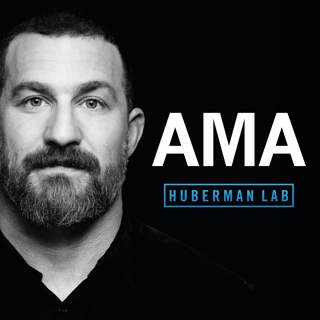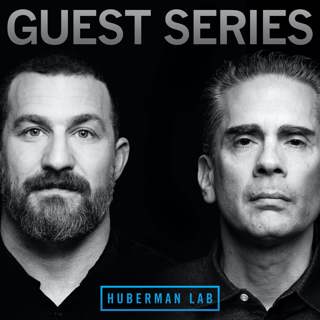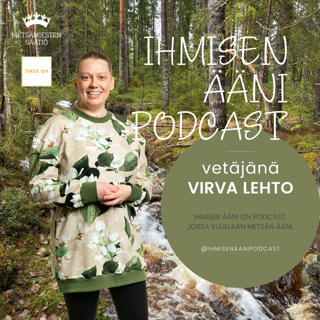
How to Understand Emotions | Dr. Lisa Feldman Barrett
In this episode, my guest is Dr. Lisa Feldman Barrett, Ph.D., a Distinguished Professor of Psychology at Northeastern University who is a world expert in the science of emotions. She explains what emotions are and how the brain represents and integrates signals from our body and the environment around us to create our unique emotional states. We discuss the relationship between emotions and language, how our specificity of language impacts our emotional processing, the role of facial expressions in emotions, and how emotions relate to sleep, movement, nutrition and the building and reinforcement of social bonds. We also discuss actionable tools for how to regulate feelings of uncertainty and tools to better understand the emotional states of others. This episode ought to be of interest to anyone curious about the neuroscience and psychology underlying emotions and for those who seek to better understand themselves and relate to others and the world in richer, more adaptive ways. For show notes, including referenced articles and additional resources, please visit hubermanlab.com. Use Ask Huberman Lab, our new AI-powered platform, for a summary, clips, and insights from this episode. Thank you to our sponsors AG1: https://drinkag1.com/huberman LMNT: https://drinklmnt.com/hubermanlab Waking Up: https://wakingup.com/huberman Momentous: https://livemomentous.com/huberman Timestamps (00:00:00) Dr. Lisa Feldman Barrett (00:03:18) Sponsors: LMNT & Waking Up (00:05:46) Core Components of Emotions (00:10:42) Facial Movement & Interpretation, Emotion (00:19:33) Facial Expressions & Emotion, Individualization (00:31:03) Emotion Categories, Culture & Child Development (00:37:10) Sponsor: AG1 (00:37:50) Legal System, ‘Universal’ Emotions & Caution (00:41:07) Language Descriptions, Differences & Emotion (00:48:18) Questions & Assumptions; Language, Emotions & Nervous System (00:53:40) Brain, Uncertainty & Categories (01:03:57) Brain & Summaries; Emotions as “Multimodal Summaries” (01:14:45) Emotional Granularity, Library Analogy (01:19:40) Brain & Compression, Planning (01:29:04) Labels & Generalization (01:34:29) Movement, Sensation, Prediction & Learning (01:42:44) Feelings of Discomfort & Action (01:50:32) Tool: Feelings of Uncertainty, Emotion, “Affect” (02:01:18) Tool: Experience Dimensions & Attention; Individualization (02:08:36) Affect, Allostasis & Body Budget Analogy (02:15:41) Depression, “Emotional Flu” (02:20:20) Tool: Positively Shift Affect; Alcohol & Drugs; SSRIs (02:27:40) Relationships: Savings or Taxes, Kindness (02:36:50) Zero-Cost Support, Spotify & Apple Reviews, Sponsors, YouTube Feedback, Momentous, Social Media, Neural Network Newsletter Disclaimer Learn more about your ad choices. Visit megaphone.fm/adchoices
16 Loka 20232h 36min

How to Increase Your Willpower & Tenacity
In this episode, I discuss neuroscience and psychology studies that address the basis of willpower and tenacity, how they differ from motivation and how we can all increase our levels of willpower and tenacity. I discuss whether willpower is a limited resource, the controversial “ego depletion” theory of willpower and the role that beliefs play in determining our tenacity and willpower. Then, I discuss the neural basis of willpower in the brain and body and how tenacity and willpower relate to sleep, stress, focus, and possibly lifespan. Then, I provide a series of science-supported tools and protocols to increase your level of tenacity and willpower. For show notes, including referenced articles and additional resources, please visit hubermanlab.com. Use Ask Huberman Lab, our new AI-powered platform, for a summary, clips, and insights from this episode. Thank you to our sponsors AG1: https://drinkag1.com/huberman LMNT: https://drinklmnt.com/hubermanlab Waking Up: https://wakingup.com/huberman Momentous: https://livemomentous.com/huberman Timestamps (00:00:00) Tenacity & Willpower (00:01:36) Sponsors: LMNT & Waking Up (00:03:49) Tenacity & Willpower vs. Habit Execution; Apathy, Depression & Motivation (00:10:40) Ego Depletion & Willpower as a Limited Resource; Controversy (00:19:14) Tool: Autonomic Function, Tenacity & Willpower; Sleep & Stress (00:28:31) Sponsor: AG1 (00:28:58) Willpower as a Limited Resource (Theory) (00:35:36) Willpower & Glucose, Brain Energetics (00:42:44) Beliefs about Willpower & Glucose; Multiple Challenges (00:54:01) Willpower Brain ‘Hub’; Anorexia Nervosa, Super-Agers (01:07:15) Anterior Midcingulate Cortex & Brain/Body Communication (01:14:54) Allostasis, Anterior Midcingulate Cortex Function (01:25:19) Anterior Mid-Cingulate Cortex (aMCC), Difficult Tasks & Neuroplasticity (01:29:30) Tool: Novel Physical Exercise & Brain; Cognitive Exercise (01:43:43) Tool: “Micro-sucks”, Increase Tenacity/Willpower (01:50:58) Impossible Tasks, Super-Agers & Learning, Will to Live (01:57:23) Tool: Rewards & Improving Tenacity/Willpower (02:01:07) Tenacity & Willpower Recap (02:05:55) Zero-Cost Support, Spotify & Apple Reviews, Sponsors, YouTube Feedback, Momentous, Social Media, Neural Network Newsletter Disclaimer Learn more about your ad choices. Visit megaphone.fm/adchoices
9 Loka 20232h 5min

How to Succeed at Hard Conversations | Chris Voss
In this episode, my guest is Chris Voss, a former Federal Bureau of Investigation (FBI) agent who was the lead negotiator in many high-risk, high-consequence cases. Chris has taught negotiation courses at Harvard and Georgetown Universities and is the author of the book “Never Split the Difference.” We discuss how to navigate difficult conversations of all kinds, including in business, romance and romantic breakups, job firings and tense conversations with family and friends. Chris explains how to navigate online, in person and in written negotiations, the red flags to watch out for and how to read body and voice cues in face-to-face and phone conversations. He explains how to use empathy, certain key questions, proactive listening, emotional processing and more to ensure you reach the best possible outcome in any hard conversation. This episode ought to be of interest to anyone looking to improve their interpersonal abilities and communication skills and for those who want to be able to keep a level head in heated discussions. For show notes, including referenced articles and additional resources, please visit hubermanlab.com. Use Ask Huberman Lab, our new AI-powered platform, for a summary, clips, and insights from this episode. Thank you to our sponsors AG1: https://drinkag1.com/huberman LMNT: https://drinklmnt.com/hubermanlab Waking Up: https://wakingup.com/huberman Momentous: https://livemomentous.com/huberman Timestamps (00:00:00) Chris Voss (00:02:34) Sponsors: LMNT & Waking Up (00:04:59) Negotiation Mindset, Playfulness (00:11:41) Calm Voice, Emotional Shift, Music (00:18:59) “Win-Win”?, Benevolent Negotiations, Hypothesis Testing (00:28:38) Generosity (00:33:06) Sponsor: AG1 (00:33:44) Hostile Negotiations, Internal Collaboration (00:39:40) Patterns & Specificity; Internet Scams, “Double-Dip” (00:48:15) Urgency, Cons, Asking Questions (00:54:46) Negotiations, Fair Questions, Exhausting Adversaries (01:02:18) “Vision Drives Decision”, Human Nature & Investigation (01:07:47) Lying & Body, “Gut Sense” (01:15:42) Face-to-Face Negotiation, “738” & Affective Cues (01:20:39) Online/Text Communication; “Straight Shooters” (01:26:47) Break-ups (Romantic & Professional), Firing, Resilience (01:32:16) Ego Depletion, Negotiation Outcomes (01:37:35) Readiness & “Small Space Practice”, Labeling (01:45:17) Venting, Emotions & Listening; Meditation & Spirituality (01:51:41) Physical Fitness, Self-Care (01:57:01) Long Negotiations & Recharging (02:02:40) Hostages, Humanization & Names (02:08:50) Tactical Empathy, Compassion (02:15:27) Tool: Mirroring Technique (02:22:20) Tool: Proactive Listening (02:29:48) Family Members & Negotiations (02:35:21) Self Restoration, Humor (02:39:01) Fireside, Communication Courses; Rapport; Writing Projects (02:47:45) “Sounds Like…” Perspective (02:50:54) Zero-Cost Support, Spotify & Apple Reviews, Sponsors, YouTube Feedback, Momentous, Social Media, Neural Network Newsletter Disclaimer Learn more about your ad choices. Visit megaphone.fm/adchoices
2 Loka 20232h 51min

AMA #11: Improve Task Switching & Productivity and Reduce Brain Fog
Welcome to a preview of the 11th Ask Me Anything (AMA) episode, part of Huberman Lab Premium. The Huberman Lab Premium subscription was launched for two main reasons. First, it was launched in order to raise support for the standard Huberman Lab podcast channel — which will continue to come out every Monday at zero-cost. Second, it was launched as a means to raise funds for important scientific research. A significant portion of proceeds from the Huberman Lab Premium subscription will fund human research (not animal models) selected by Dr. Huberman, with a dollar-for-dollar match from the Tiny Foundation. Subscribe to Huberman Lab Premium at www.hubermanlab.com/premium. Timestamps (00:00:00) Introduction (00:01:46) Is There a Way to Get Better at Task Switching? (00:32:17) Huberman Lab Premium In the full AMA episode, we discuss: What Can I Do in Order to Avoid Getting Brain Fog? Title Card Photo Credit: Mike Blabac Disclaimer Learn more about your ad choices. Visit megaphone.fm/adchoices
29 Syys 202334min

GUEST SERIES | Dr. Paul Conti: Tools and Protocols for Mental Health
This is episode 4 of a 4-part special series on mental health with Stanford and Harvard-trained psychiatrist Dr. Paul Conti, M.D. Dr. Conti explains what true self-care is and how our mental health benefits from specific self-care and introspection practices — much in the same way that our physical health benefits from certain exercise and nutrition habits. He describes how the foundation of mental health is an understanding of one’s own mind and the specific questions to ask in order to explore the conscious and unconscious parts of ourselves. He describes how this process can be done either on our own, through journaling, meditation and structured thought, or in therapy with the help of a licensed professional. He also explains how unprocessed trauma can short-circuit the process and how to prevent that, and the role of friendships and other relational support systems in the journey of self-exploration for mental health. People of all ages and those with and without self-introspection and therapy experience ought to benefit from the information in this episode. For show notes and additional resources, please visit hubermanlab.com. Thank you to our sponsors AG1: https://drinkag1.com/huberman BetterHelp: https://betterhelp.com/huberman Waking Up: https://wakingup.com/huberman Momentous: https://livemomentous.com/huberman Timestamps (00:00:00) Self Care (00:02:37) Sponsors: BetterHelp & Waking Up (00:05:34) What is Self-Care?, Foundation, Self-Understanding (00:13:18) Life Narratives (00:15:24) Journaling, Self-Inquiry & Therapy (00:24:41) Unconscious Mind, Salience & Journaling; Panic Attacks (00:28:20) Self-Inquiry; Grief & Death (00:33:23) Sponsor: AG1 (00:34:39) Self-Harm, Hopelessness & Therapy (00:37:27) Apprehension of Unconscious Mind Exploration (00:42:34) Mental Health Map: Cupboards, Agency & Gratitude, Generative Drive (00:54:18) Structure of Self, Unconscious Mind, Abscess Analogy (01:01:57) Exploring the Unconscious Mind, Curiosity, “Question the Givens” (01:10:48) Conscious Mind Exploration; Self Curiosity, Busyness (01:19:20) Exploring Defense Mechanisms, Character Structure (01:24:54) Self & Character Structure, “Tending the Garden” (01:32:45) Function of Self Cupboards (01:35:50) Self-Awareness Exploration, Mirror Meditation (01:38:34) Defense Mechanisms in Action & Self-Inquiry, Patterns (01:47:15) Salience Exploration, Grounding Meditation (01:52:37) Behavior & Self-Reflection; Phantom Driver Analogy (02:00:14) Self & Strivings; Empowerment & Humility (02:09:07) Challenges in Certain Life Domains (02:17:49) Friendships & Support, Social Media (02:23:50) Anger & Self-Care (02:34:18) Self-Care & Challenges (02:38:43) Zero-Cost Support, YouTube Feedback, Spotify & Apple Reviews, Sponsors, Social Media, Momentous, Neural Network Newsletter Title Card Photo Credit: Mike Blabac Disclaimer Learn more about your ad choices. Visit megaphone.fm/adchoices
27 Syys 20232h 41min

Efforts & Challenges in Promoting Public Health | U.S. Surgeon General Dr. Vivek Murthy
In this episode, my guest is Dr. Vivek Murthy, M.D., the acting U.S. Surgeon General who earned his undergraduate degree from Harvard and his M.D. from Yale School of Medicine. We discuss nutrition, food additives, social media and mental health, public health initiatives to combat the crisis of social isolation, the obesity crisis, addiction and other pressing issues in public health. Dr. Murthy explains the role of the U.S. government in promoting specific public health issues and the steps needed to rebuild public trust in scientific and medical information. We also discuss health care accessibility, insurance barriers and individual versus team-based medical care. We also discuss topics gleaned from listener questions, such as the facts and myths about “Big Pharma” and “Big Food” industries, scientific research and public health policies. For show notes, including referenced articles and additional resources, please visit hubermanlab.com. Use Ask Huberman Lab, our new AI-powered platform, for a summary, clips, and insights from this episode. Thank you to our sponsors AG1: https://drinkag1.com/huberman LMNT: https://drinklmnt.com/hubermanlab Waking Up: https://wakingup.com/huberman Momentous: https://livemomentous.com/huberman Timestamps (00:00:00) Dr. Vivek Murthy (00:02:10) Sponsors: LMNT & Waking Up (00:04:35) Surgeon General Roles (00:07:44) Illness Framework, Enhancing Wellbeing (00:12:42) Priorities as Surgeon General (00:19:50) Public Health Message Distribution (00:28:24) Diagnosis vs. Optimizing Health (00:33:24) Sponsor: AG1 (00:34:01) Food Additives, Highly Processed Foods, Food Availability (00:39:11) Difficulties Addressing Health Issues & Highly Processed Foods (00:49:53) Retribution, Integrity & Public Trust (00:54:41) Company Opposition (00:59:50) Public Health Communication, Masks & COVID-19, Public Trust (01:07:01) Masks, Humility; Building Public Trust (01:10:45) Rebuilding Relationship to Public, Vaccines (01:17:41) Community Core & Diversity; Federal Funding (01:24:55) Big Pharma, “Pill for Every Problem” Society (01:31:48) Interdisciplinary Medical Teams, Individualized & Value-Based Medical Models (01:38:44) Insurance Barriers, Mental Health Care, Drug Prices (01:44:40) Isolation Crisis, Social Disconnection, Health Risks (01:49:15) Community Organizations & Modern Life, Social Media (01:56:36) Youth & Social Media, Parents, Policy Change (02:06:45) Real Life vs. Social Media, Kids & Playtime (02:11:56) Social Media Advice for Parents (02:20:43) Society & Disconnection, Human Connection & Service (02:31:20) Zero-Cost Support, Spotify & Apple Reviews, Sponsors, YouTube Feedback, Momentous, Social Media, Neural Network Newsletter Disclaimer Learn more about your ad choices. Visit megaphone.fm/adchoices
25 Syys 20232h 31min

GUEST SERIES | Dr. Paul Conti: How to Build and Maintain Healthy Relationships
This is episode 3 of a 4-part special series on mental health with Dr. Paul Conti, M.D., a psychiatrist who did his medical training at Stanford School of Medicine and residency at Harvard Medical School. He is the author of the book, “Trauma: The Invisible Epidemic.” Dr. Conti explains how to find, develop and strengthen healthy relationships — including romantic relationships, work and colleague relationships, and friendships. He explains a roadmap of the conscious and unconscious mind that can allow anyone to navigate conflicts better and set healthy boundaries in relationships. We also discuss common features of unhealthy relationships and clinically supported tools for dealing with relationship insecurity, excessive anxiety, past traumas, manipulation and abuse. Dr. Conti explains how, in healthy relationships, there emerges a dynamic of the mutually generative “us” and how to continually improve that dynamic. The next episode in this special series explores true self-care, which can be cultivated through a process of building self-awareness along with other important practices. For the full show notes, visit hubermanlab.com. Thank you to our sponsors AG1: https://drinkag1.com/huberman BetterHelp: https://betterhelp.com/huberman Waking Up: https://wakingup.com/huberman Eight Sleep: https://eightsleep.com/huberman Momentous: https://livemomentous.com/huberman Timestamps (00:00:00) Build Healthy Relationships (00:02:04) Sponsors: BetterHelp & Waking Up (00:05:01) Healthiest Self in Relationships (00:10:51) Structure & Function of Self (00:15:44) Relationships, Levels of Emergence (00:22:48) Generative Drive in Relationships (00:35:00) Sponsor: AG1 (00:36:26) Generative Drive, Aggressive Drive, Pleasure Drive (00:45:16) Romantic Relationships & Matched Generative Drives, Trauma Bonds (00:53:05) Generative Drive Expression, Libido, Giving & Taking (01:04:29) Sponsor: Eight Sleep (01:05:50) Generative Drive in Partnerships (01:11:16) Libido, Avoidance & Working through Barriers (01:18:02) Repeating Bad Relationship Patterns, Repetition Compulsion (01:29:23) Narcissism, Dependence, Attachment Insecurity (01:34:10) Abusive Relationships, Demoralization (01:39:37) Oppressors, Darkness, Hope & Change (01:48:08) Work Relationships, Oppression & Accountability (01:53:53) Jealousy vs. Envy, Narcissism (01:59:13) Power Dynamics in Relationships (02:05:54) Giving vs. Taking in Relationships (02:09:39) Transactions & Relationships; Family & Generative Drive; Flexibility (02:19:47) Relationships & Kindergarten (02:23:04) Anxiety in Relationships, Communication (02:31:32) The “Magic Bridge of the Us” (02:37:09) Mentalization, Getting into Another’s Mindset; Navigating Conflict (02:46:51) Healthy Boundaries (02:52:08) Self-Awareness, Mentalization (02:55:28) “Broken Compass” & Self Inquiry, “Map” Analogy (03:02:25) Zero-Cost Support, YouTube Feedback, Spotify & Apple Reviews, Sponsors, Social Media, Momentous, Neural Network Newsletter Title Card Photo Credit: Mike Blabac Disclaimer Learn more about your ad choices. Visit megaphone.fm/adchoices
20 Syys 20233h 4min

How to Use Music to Boost Motivation, Mood & Improve Learning
In this episode, I describe how your brain and body are fundamentally wired to perceive and respond to music and how those responses can be leveraged to improve your mood, allow for processing sad emotions and enhance learning and performance. I explain the data showing how music can increase motivation for cognitive or physical work, what specific music has been shown to enhance cognitive performance, and whether silence or music is more effective in enhancing focus while studying. I also discuss how specific musical pieces can rapidly reduce anxiety, as well as certain prescription medications. I explain how listening to certain types of music can improve various health metrics (e.g., heart rate). Finally, I discuss how music helps to enhance neuroplasticity (rewiring of brain connections), thereby improving learning and memory. Whether you sing, play an instrument or enjoy listening to music, this episode provides numerous science-informed tools for using music to enhance productivity, mood, emotional states, and overall enjoyment of life. For show notes, including referenced articles and additional resources, please visit hubermanlab.com. Use Ask Huberman Lab, our new AI-powered platform, for a summary, clips, and insights from this episode. Thank you to our sponsors AG1: https://drinkag1.com/huberman LMNT: https://drinklmnt.com/hubermanlab Waking Up: https://wakingup.com/huberman Momentous: https://livemomentous.com/huberman Timestamps (00:00:00) Music & Your Brain (00:03:32) The Brain Body Contract (00:03:49) Sponsors: LMNT & Waking Up (00:07:09) Music & Emotions; Brain & Body Interpretation (00:13:03) Music & Intent; Babies, Music & Movement (00:19:19) Tool: Health Metrics & Music, Breathing & Heart Rate (00:29:16) Sponsor: AG1 (00:30:50) Music, Brain & Predictions (00:38:07) Music & Brain: Novelty, Arousal, Memories (00:44:22) Tool: Movement; Motivation & Faster Music (00:50:49) Tool: Cognitive Work & Binaural Beats (00:54:11) Silence or Music for Studying?, White Noise, Binaural Beats (00:58:47) Tool: Retain Information & Internal Dialogue (01:00:53) Tool: Focus, Work Breaks & Music (01:04:11) Physical Exercise, Performance & Music (01:08:43) Music & Shifting Mood (01:14:41) “Happy” vs. “Sad” Music, “One-Hit Wonders” & Artificial Intelligence (01:19:30) “Bass Face”; Music, Movement & Facial Expressions (01:22:46) Tools: Shift to Happy Mood with Music; Sad Mood Catharsis (01:27:30) Tool: Music & Reducing Anxiety, “Weightless” (01:31:16) Playing Instruments, Singing & Brain Connectivity (01:39:58) Music & the Brain (01:42:14) Zero-Cost Support, Spotify & Apple Reviews, Sponsors, YouTube Feedback, Momentous, Social Media, Neural Network Newsletter Disclaimer Learn more about your ad choices. Visit megaphone.fm/adchoices
18 Syys 20231h 41min





















